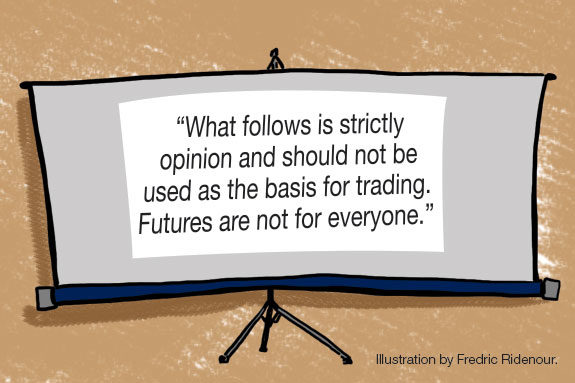Dairy farmers aren’t the only people struggling with tougher regulations these days. Just ask your banker or commodities broker. Better yet, allow the topic to come up naturally during a conversation.
Let’s say you’re at the county fair on a nice summer weekend and you run into your broker.
You discuss the weather. He asks about your family. You both heap praise on the white-clad 4-H’ers and the dairy heifers they’re leading around the show ring.
Then the conversation turns to the corn market and you casually mention that you might want to place an order. Your broker stops you in mid-sentence.
“Hold on,” he says. “I need to record this conversation.”
As absurd as that might sound, it’s not far-fetched.
One of the new rules affecting brokerage firms states that all client communication leading to an order must be recorded.
What is the broker at the county fair supposed to do, assuming that he doesn’t carry around a pocket recorder all the time?
“Do we have the conversation by phone again on Monday after 8 a.m.?” Scott Stewart, president of the Stewart-Peterson Group Inc. of West Bend, Wisconsin, asks rhetorically.
“Farmers don’t keep regular office hours, and advisers who serve their clients well talk with them at varying times and places,” he says.
Broker-client conversations can occur at a variety of places such as the client’s home, a conference or via cell phone while the farmer is working. Recording and cataloging all that communication would be impractical and nearly impossible for most commodity brokers.
“Big Wall Street securities firms might have that capability, but it doesn’t apply to how we do business with farmers,” Stewart says.
The new rule is one of many in Dodd-Frank, a sweeping financial reform bill passed by Congress in response to the 2008 financial crisis.
The initial targets were the big banks, insurance companies and mortgage originators that were at the center of the financial crisis. But regulators didn’t stop there.
The new regs have also hit the brokers, advisers and consultants who are licensed to trade futures and options.
“This is big government at its worst,” Stewart says.
“There is no correlation between the people who caused the 2008 financial meltdown and the futures industry,” he says. “They are simply cluttering up the way that good, honest people give good service to their clients.”
Another new rule says that an adviser can’t do research and give advice at the same time. Firms must have one person for research and another to offer advice.
“That might be fine for big firms, but it doesn’t take into account how many small advisory firms serve farm clients,” Stewart says.
Good, knowledgeable advisers conduct research in order to offer good advice, he says.
“I find it ironic that the government wants farmers to be less dependent on government support, and yet puts rules and regulations in place that ultimately make it more difficult for farmers and their advisory firms to work together to manage risk.”
Dodd-Frank has many facets; some of the new rules have already been implemented while others have yet to take effect.
The rule regarding recorded conversations takes effect at the end of this year. Firms with less than $5 million of cumulative futures-related business over the previous three years are exempt. The rule requiring separation of research and trading functions has already taken effect.
Commodity brokers/advisers say the new rules are excessive and fail to correct the problems they were designed to prevent, at least as applied to the futures industry.
The National Futures Association already watches advisers very closely, Stewart says. He heads the NFA’s introducing broker advisory committee.
Brokers must now exercise an abundance of caution when interacting with clients or potential clients, regardless of what form of communication is used.
The new rules apply to both verbal and written communications.
“We have added a more in-depth risk disclosure statement at the bottom of our newsletters, and one of the owners of the firm does routine audits on all brokers’ emails that are corresponding with clients,” says Katie Krupa, director of producer services at Chicago-based Rice Dairy .
Dairymen will notice other changes when they attend industry conferences.
One new rule requires advisers to announce during presentations that they’re soliciting business, when in fact that is not always the case. Sometimes they’re just sharing information that they think will be useful and don’t stand to gain anything by it, advisers say.
Dairymen will also notice a longer and more conspicuous disclaimer during presentations.
“The disclaimer slide that we’ve always had has been reworded,” says Joseph Kerns, president of Kerns & Associates, Ames, Iowa. “It’s now at the front of each presentation. It appears right after the title slide.”
The disclaimer warns that what follows is strictly opinion, should not be used as the basis for trading and that futures and options are not for everyone, etc.
In the past, advisers might feel free to discuss secondary topics that pop up but were not part of the prepared material. Not anymore.
Compliance officers within each firm must approve all information prior to the presentation.
Advisers are not to veer from the script.
If the formal presentation doesn’t mention dried distillers grains, for instance, they’re barred from saying anything about it.
The end result is that advisers are not sharing as much information as they once did during industry gatherings.
“We must now exercise extreme caution,” Kerns says.
The free-wheeling discussions that once typified question-and-answer sessions may have become a thing of the past.
“It absolutely takes all the conjecture out of a presentation,” Kerns says, “but it also takes the life out of it.” PD
Wilkins is a freelance writer based in Twin Falls, Idaho.





